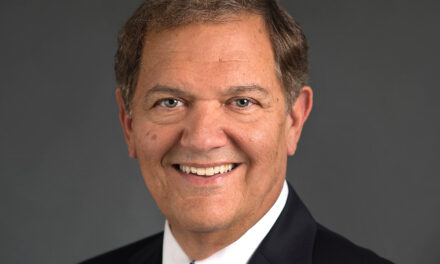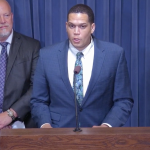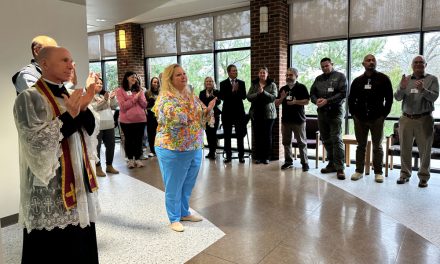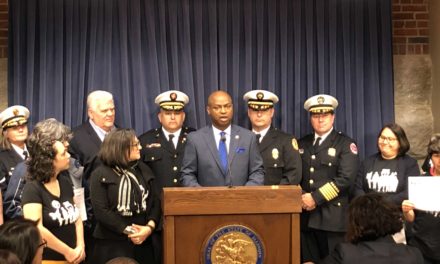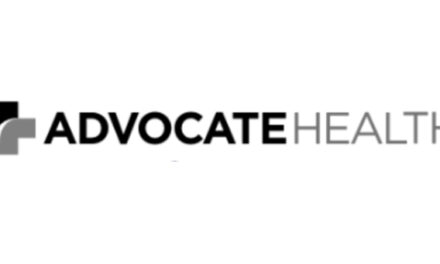
Israel Rocha reflects on first year as CEO of Cook County Health
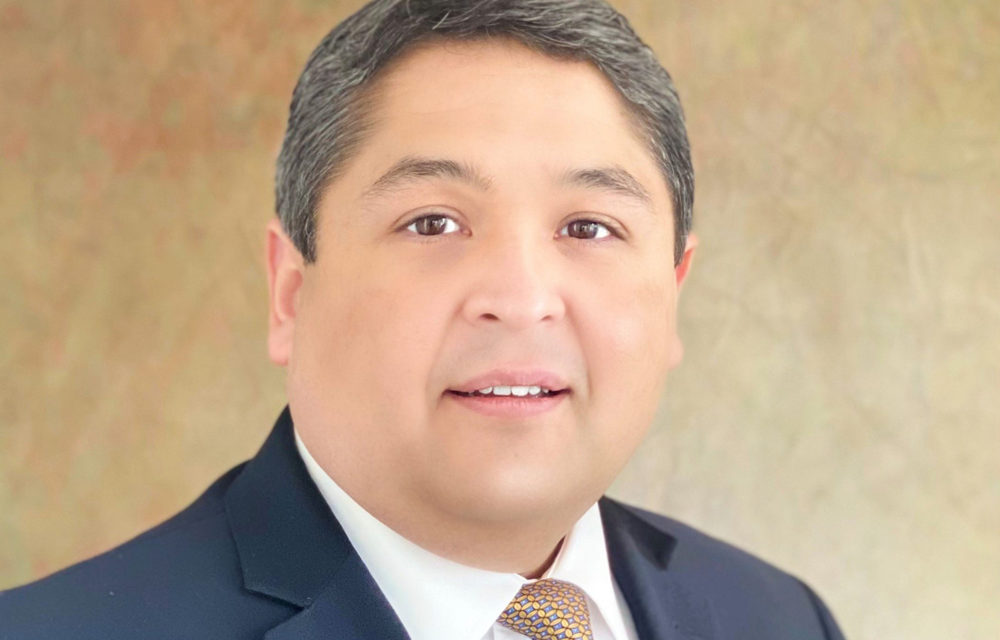
Through a year that has seen multiple COVID-19 surges and challenges throughout the healthcare industry, Cook County Health CEO Israel Rocha said he is proud of what the health system has been able to accomplish in his first 12 months.
“I think the year has been exciting, and we have made some impactful programs come to light there in the last 12 months,” he recently told Health News Illinois.
Rocha joined Cook County Health last December, having previously served as CEO of NYC Health + Hospitals’ Elmhurst Hospital and Queens Hospital.
In a wide-ranging interview, Rocha spoke to Health News Illinois about the system’s response to the pandemic, addressing workforce challenges, charity care and ongoing expansion plans at Provident Hospital.
Edited excerpts below.
HNI: How has your first year gone at Cook County Health? What are some of the highlights?
IR: Some of the things we’re most proud of is our ability to stand up a mass vaccination program that has given over 920,000 vaccine doses to our community, and in doing so, to do it in a way that was innovative. We go back to when this program got started, people were even concerned about what group they fell into, what zip codes they could go to, and really needed a lot of information. We stood up a website that was able to help people get registered, give people information and education. Then we created mass vaccine centers to make sure that we get as many people served as quickly as possible. We put those vaccination centers in communities that were the greatest impacted by COVID infection, and in some of our areas that had the greatest need that were traditionally underserved. And to do so in a way that was quickly improved, I think was very meaningful to us. And then to launch, when there were some questions in the community, to launch a community campaign that helped people get answers directly from their physicians through some of our educational media spots to ensure that people had what they needed. And that was really special, to be able to be there to be responsive to our community.
We’ve also done amazing things to increase access to care by opening Belmont Cragin and bringing a brand new state-of-the-art ambulatory center there. Officially opening Blue Island, which is also an ambulatory care center, and bringing in additional services like expanding our cardiac service line. And really for the first time, they are being made available to everyone regardless of their ability to pay. That’s really important.
HNI: What have been some of the biggest challenges you’ve faced over the past year, COVID-19 related or otherwise?
IR: I think there are two things that come to mind that almost every single hospital across the country is facing. First and foremost, misinformation. And I call it the second virus that’s attached to COVID-19. And the reason for that is because sometimes we don’t fully appreciate the severity that misinformation has. And the reason I started calling it a virus is because it can take lives. Misinformation about what the vaccine means or the severity of COVID-19. People spreading things that are not accurate puts lives at risk, and it causes lives to be lost. And I think that is a big challenge that even when we’re trying to get information out there, there is a consistency of misinformation. And that is truly unfortunate because while we may struggle with new mutations of COVID, we shouldn’t have to struggle with mutations of truth. And I think that’s incredibly important. The other one, of course, is health staff challenges. I think like everyone, we’ve had a new need for many new healthcare providers to be working in vaccines and testing, while still having increased needs in ambulatory and acute care medicine services. That has truly taken a toll on the healthcare staffing, and you’re seeing that happen nationally. And how we stay ahead of that, and how we ensure safe operation is very important.
HNI: Workforce has been an issue across the health industry. What is the health system doing to hire and retain staff during this time?
IR: We had a helpline established for employees. We, of course, have an employee assistance program to make sure that people are taking off time for themselves and having additional resources to ensure their wellness. We have implemented a patient navigator program to bring more resources and more staff. We have onboarded additional staff and expanded our staffing workforce by working with temporary agencies and bringing in additional members from the entire country to be here to work with us. And even at times, we’ve even partnered with our local Reserve Corps from the military, to be able to do that through the National Guard, to augment our services. So we have searched every corner, whether it’s working with the state and National Guard, bringing in temporary resources, expanding and investing in our team so that everybody feels that they’re important. And even having special events where we simply just say, ‘We see you, we thank you and we are indebted for your service.’
HNI: What impact has the COVID-19 pandemic had on charity care?
IR: We’ve actually seen a little bit of a decrease in our charity care and our charity care funding. And the reason for that has been, we’re very thankful to our local, state and federal leaders for ensuring that, regardless of your income status or any traditional barrier to access to care that was available, that everyone had coverage to be able to get assistance during COVID. So what we have seen is more individuals qualify for healthcare services through COVID, and new emergency programs were made available to treat and help people, and that has had a slight decline in our charity care numbers. It’s still very large, but it was a little bit less this year for the first time in quite a while, because we had additional resources of coverage and eligibility for patients who are suffering from COVID.
HNI: What are steps the system can take to address charity care going forward? Are there still conversations with other health systems about helping to take some of that care?
IR: First, I really think it’s important that we understand where our charity care comes from. Because you’ll often hear a lot of systems that say, ‘Well, we treat everybody, especially if they’re in an emergency and because of (the Emergency Medical Treatment and Labor Act), every hospital gives some charity care.’ The reason ours is so large or unique is in the sense that we offer a full spectrum of services to everybody, regardless of the ability to pay. And that means that you get a primary care provider, you get benefit services, you get pharmaceutical coverage, you get full specialty care like the surgical procedures for advanced sub-specialties. And those services, that full spectrum of a very large, robust comprehensive health system, is made available to everyone regardless of your ability to pay. And that’s where you have it, those elective surgical procedural services are what drive up that differential, especially in outpatients. And that is something where Cook County Health stands alone and unique in making available of those services to everyone.
We’re definitely happy to have other people join us, but we find that space, where we’re offering truly open access, universal service to all patients … we are alone. Now what we have done to work with others is to see how we can bolster information, how people can get information, if they’re qualified for financial benefits. We work with the Legislature to pass legislation that has some requirements for financial counseling to be given to patients so they could understand their coverage rights and where they can get assistance before being denied for a service. And we definitely keep a line of sight on what has been done to increase new programs. Illinois’ been truly innovative in creating a Medicaid look-alike qualification for non-residents over the age of 55, and that will definitely have some impact on our charity care numbers and we’re happy that more people will be eligible for coverage. And we hope that that coverage continues beyond 55. And that’s really what I think will have the biggest impact.
HNI: What is the latest on Cook County’s $240 million plan to expand and renovate Provident Hospital?
IR: For the past year, we have been working to do a few things to Provident because our goal is to start improving services today and tomorrow. So for today, we’ve done a few things. We put in the budget last year and continued this year to hopefully get to a point where we can reopen for ambulance runs in our emergency department. So we have refortified our emergency medicine team and our emergency management services. We’re doing some construction to our ambulance space that is almost completed so that we can restart taking ambulance runs. But that is also connected to two other services because we can’t have ambulances without having a medical-surgical capacity and a critical care team. So we have also made investments to expand our number of patients that we can serve and our medical-surgical services at Provident. Right now, we have an average census of about 10 patients, which is very small for a footprint. We’re hoping to grow that to 25 … and then restarting our six-bed critical care ICU service. We also have done quite a bit to increase our surgical volume and we put all our ORs at the Provident campus back into operation. We have also moved specialty care clinics into Provident so that patients have a one-stop community health center shop that they can go to for all their needs, from acute to preventative and everything in between.
So I think we have a full robust plan that will help Provident get much more utilization of patients and they’ll be there to serve the community in a greater way. And we have also been planning to help create a replacement campus that hopefully sometime during fiscal year 2022 … we will be having a plan put out to bid on the replacement. There will be a new modern, expanded community hospital for the Provident community.
I would also say that on the Provident side, we also have really helped to stand up a nephrologist program that has been started. We opened our outpatient dialysis center, which is a wonderful center that’s almost at capacity and ahead of schedule on the number of patients that we’re serving and we’ve moved additional coverage there. And so we’re doing very well with that area.
HNI: What are some of your longer-term goals for the health system?
IR: First and foremost, our safety is critically important and how we offer enhanced services to bolster our patient safety and our clinical excellence is going to be important. So you’ll see more centers and institutes be opened, especially in those areas where Cook County right now has a lot of need. And when we look at Cook County, and we look at illnesses that are driving premature mortality, we see a lot of need in cardiovascular disease and neurological conditions and in oncology. Those are critical things that we need to address, and so I think you’ll see some new enhanced services, service lines and service institutes. I think you’re going to be seeing some modernization of our infrastructure. And hopefully, you’ll start to see Cook County consistently serve at the top across the country on quality and performance, and that’s really our goal.
But at the end of the day, our goal is to make sure that we create a world-class center that has the best medicine to be offered, that is universally accessible and universally available to every single patient. So that we can prove, once and for all, that healthcare as a human right is possible and achievable. And that we have made a meaningful improvement in reducing the life expectancy disparities that exist between our communities that are most affluent and our communities with the greatest challenge. And we have built a system that is responsive, that is easy to use, and that is open to everyone and ready to serve with the most comprehensive medicine available in the country.

